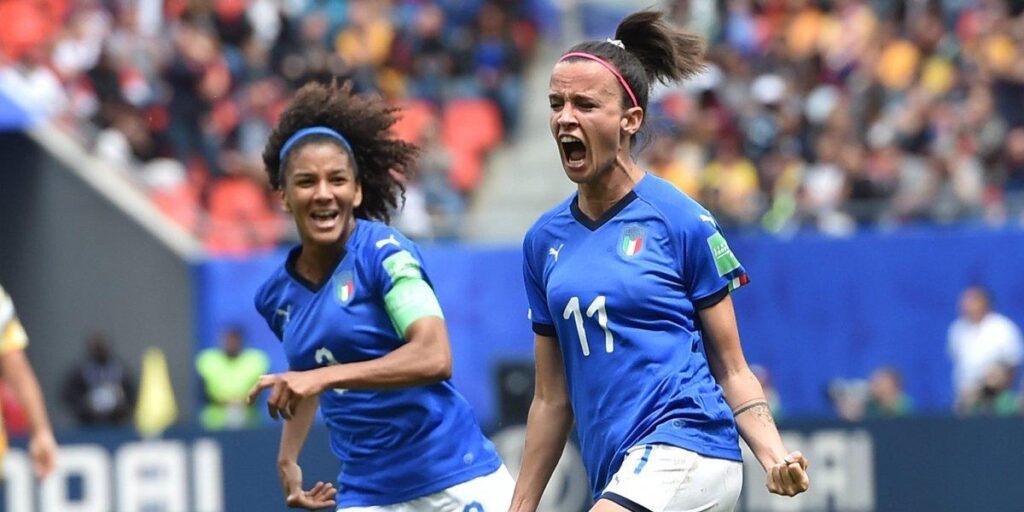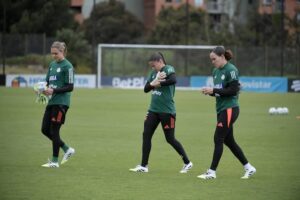
Barbara Bonansea (34) is one of the main protagonists of Italian women's football and in recent years it has become a symbol of determination and growth for the entire movement of women's sport. His career, full of successes with Juventus Women and the 'Nazionale' (Italian selection), reflects the evolution of a sport that in Italy has reached professionalism and unprecedented visibility.
Source of inspiration for many young soccer players, is still a reference inside and outside the field, also looking beyond the borders and finding in the Spanish model and, in particular, in Barça, a technical and organizational example of which to take reference to continue improving.
In an exclusive interview with Mundo Deportivo, Bonansea reviewed the key moments of his life on the pitch and shared his vision of the future of women's football.
Your career in Italian women's football has been extraordinary and continues to be. Looking back, what have been for you the most important moments, both personally and for the growth of women's football in Italy?
First of all, thanks! In women's football I have only played in three teams, and each change has been key in my career. I started in male teams until the age of 13, then I went to Torino, then to Brescia, where I grew up a lot and understood that I wanted to be a footballer. The jump to Juventus was several levels and confirmed that it was on the right path. My evolution has gone hand in hand with that of women's football in Italy: to be almost unknown to gain visibility and achieve professionalism, thanks also to the struggles with classmates such as Sara Gama. The arrival of Juventus to female changed the perspective of the movement and motivated other clubs to invest.
From his point of view, in which phase is women football today in Italy? The passage to professionalism has been an important advance, but what do you still have to consolidate it fully?
We are undoubtedly in a growth phase. In recent years we have had ups and downs, but now the comparison with a start-up compares to become a solid company comes to mind. A key step arrived in 2019, with the good role of the selection in the World Cup, which promoted the interest and number of girls who wanted to play. Then came a fall, also because of the effect of pandemia, but we continue working until professionalism, a crucial moment for women's football and for all athletes in Italy. Today the interest is stabilizing and, in this fourth year of professionalism, the clubs begin to consolidate. Our path in the last Eurocup and the growth of the entire tournament, compared to four years ago, show that when invested, the results arrive.
It is a reference for many girls and girls at this time, how does that role live and what message would you like to leave the new generations that dream of being soccer players?
I thank you again! The beautiful thing is to “not feel” a reference. In the sense that, in the field, I never think: “I am a reference.” I think rather about my age, that yes, I have more experience, and it is natural that the youngest observe you and try to understand how to get where we have reached. The good thing is that all this happens very naturally. I like it and never stops exciting me when, at the end of a game, girls ask you for a photo and they tell you: “I want to be like you.” It is a special moment because, when you think about it, you say: “I have done something beautiful.” By how I have lived and live today football, with passion – something that cultivates day by day, without planning it – my advice is to follow what entertains us and strive a lot. Because the starting position or in a team do not give it to you. Unless you are so talented that you arrive immediately, but even so, talent is only not enough. It is always important to strive and have ideals to fight, because, in my opinion, women always have to fight a little more than men not to stay behind.
In the last Eurocup we saw a very strong Spain, which in fact reached the final, although it failed to conquer the title. What impression left your tournament and what do you think of the level they have achieved?
They are strong. Forty. They are the current world champions and for the first time, they have reached the final of the Eurocup, reaching a very high level in a very short time. The team that brings many of its players, Barcelona, has done an extraordinary job: they have a really beautiful way of playing and a style. Every time I face them (Barça's players in the National Team), I appreciate their game and learn something new. It is true that we have also won against them, but they are still a very strong team, and every time I see them in the field I can learn a lot.
With regard to Spain, the Barcelona project includes, for example, figures such as Aitana Bonmatí, which are an example of success. What do you think of this model and what aspects could it adopt Italian women's football?
The Barcelona quarry, both male and female, I think it has a way of working that starts from the smallest categories and reaches the first team, following a very clear conductive thread. This allows, when changing category, you already have many knowledge, and I think it is an excellent method. His style of play is very technical and based on movement, and I think that the maximum expression of this is precisely Aitana Bonmatí: technique and movement. Patri Guijarro has also impressed me, the midfielder of the Spanish team. Actually, they all know exactly what to do in the field, and I think that is because they learn it since childhood. And that is precisely what makes you grow the most.
Read too

Before he has talked about Patri Guijarro, saying that Tle surprised. As for a compatriot of his who plays precisely in Barcelona, Giulia Dragoni, what do you think?
I have seen it in many concentrations with the 'Nazionale' and it is, without a doubt, a talent: it is really very good and it was already a child, when his father was trained. She is a very strong player. I remember her in the national team with only 16 years and impressed me. In this Eurocup we have lacked us, because it has difficult characteristics to find in another player. In addition, it is the first Italian to dress the Barcelona shirt that has won the UEFA Women's Champions League. I think it has a really promising future ahead.
Juventus has had a fundamental role in the development of women's football in Italy. What has meant to be part since the beginning of such a solid project?
I start a few years before the birth of the first women's Juventus team, when the quarry was created. At that time I was in the Brescia with Martina Rosaci, and we would never have imagined that in such a short time the Juventus Women could be born. When they called us, we immediately accepted and, as 'Juventina' and Turinasa, I lived it as something extraordinary. As I said before, Juventus gave an important signal to women's football. There was already the female Fiorentina, born a few years before, but I believe that Juventus contributed a different nuance, a strong signal, and that other teams followed their example, always starting from the need to invest. Reaching Juventus and finding an exceptional sports city, with everything we needed to be treated as professionals, really made the difference.
Do you remember the day they called him from Juve?
Yeah! I remember called Rita Guarino, the former coach. He asked me if I wanted to go to Juve and, naturally, I said yes. It was totally unexpected: I played in Brescia, which at that time was one of the most prominent teams in women's football, and think that Juventus could call me seemed impossible. When it happened, it was very happy and super excited.





